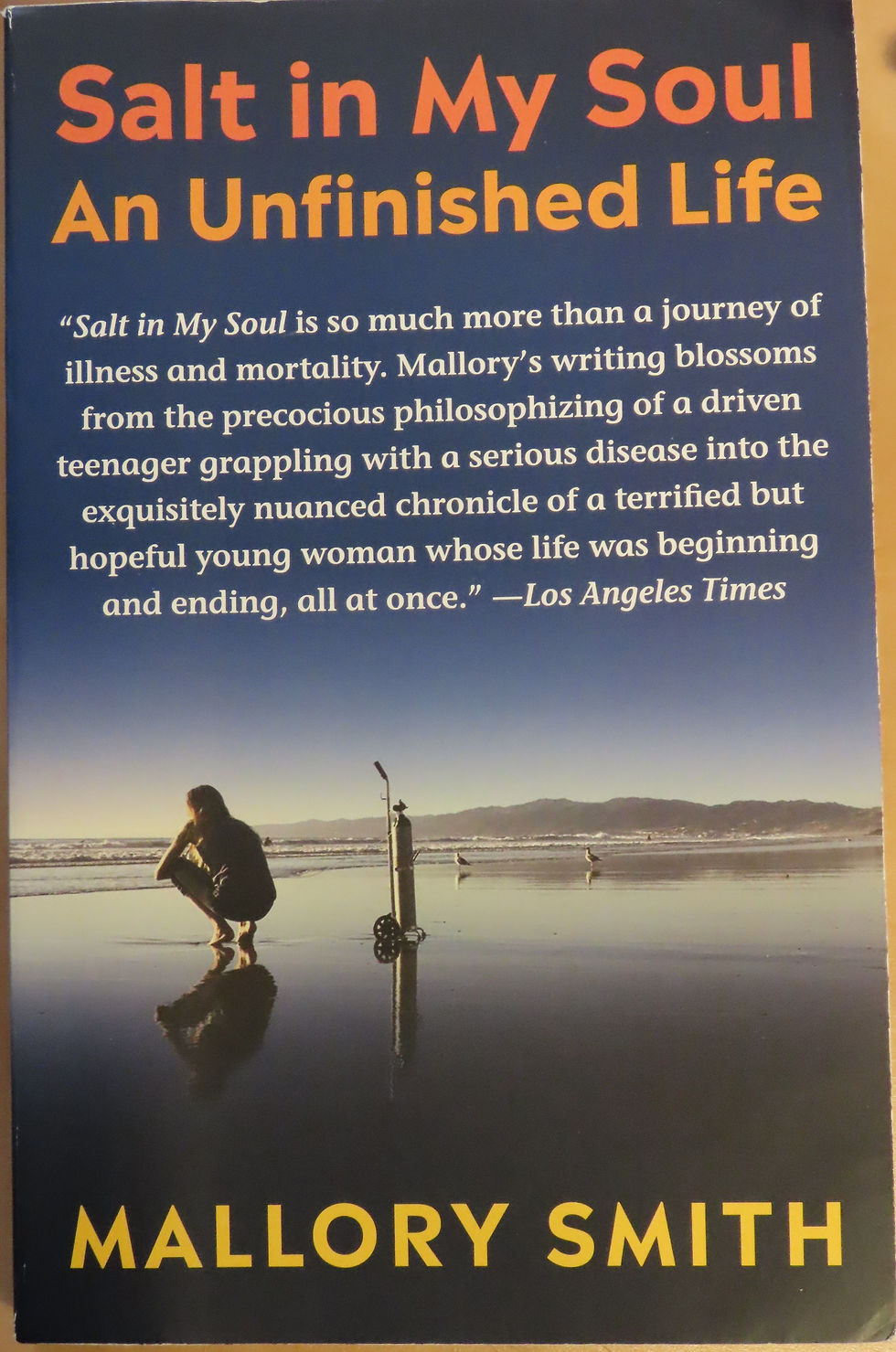
Published by Random House 2020
ISBN 978-1-9848-5544-2
299 pages
5/5 stars
Diary, cystic fibrosis, reduced life expectancy, family support, lung transplantation,
Being sick from cystic fibrosis (CF) Mallory wrote a diary from the age of 15 to her death 25 years old after lung transplantation.
This book is based on the diary of 2500 pages in her computer, edited by her mother, Diane.
I recommend this book to everyone working in health care to better understand what the patient feels coping with a chronic debilitating disease, not only CF. I also recommend this book to people with a family member with a chronic disease, for sure if it is cystic fibrosis, but no only; I think any family with a young patient with chronic disease could benefit from reading this book. Here is a lot of insight into how the patient feels and reacts, things that may not be said to the physician or the nurse or the family taking care of him or her.
This is a very strong book that will not leave me to get to the next book.
I got to know Mallory as a very strong person much more mature than her age; somebody I would have loved to spend time with, I did get to know her through her book. She was a wonderful writer.
Here are things she wrote about her very serious disease and quotes that for me define her:
My disease has proven itself to be a cunning and unpredictable enemy, attacking from the inside like a Troyan horse (p 91).
I dream that one day CF will stand for ‘cure found’ (p 63).
I drop my books…..cough. Drop my backpack, cover my mouth… Cough, spew, swallow, cough, spew, swallow. Standing again, a deep breath, incomplete, cough, spew. (p11)
There is no time to not to enjoy every single day, because the days go by so damn fast (p158)
My life is filled with love, with fun experiences, with happiness (p119)
Evolution seemed like a religion, but it isn’t one because it does not require faith, it encourages you to question, to dig, literally, to understand the origin of our species, and the complex history of genetic matter that existed, mutated, and evolved to construct this current world of ours. (p109)
Human sickness and environmental destruction are one and the same. The bacteria in my lungs are to me what the human species is to the planet. It’s just a matter of scale and perspective (p102)
Often when patients have diseases that are not so common, health care staff encourages to join patients’ groups to have a place to talk about common problems, it relieves stress. In the book, it was heart breaking to hear how one after one Mallory’s friends with CF died from advancing disease, waiting for lung transplantation, after lung transplantation.
On Cystic fibrosis (CF) is rare but the most common genetic disease among Europeans, 1/2500 -1/4500 live births, with about 70,000 patients worldwide. CF is associated with mutations on chromosome 7 in the gene that encodes the cystic fibrosis transmembrane conductance regulator (CFTR), identified for the first time in 1989. This protein forms the CFTR channel (an ABC transporter) on epithelial cell membranes that allow flow of chloride and bicarbonate, a process requiring energy from ATP. The direction of flows depends on electro-chemical forces; water flows passively along concentration gradients. In this way the quality of epithelial cells secretions is determined, like sputum in the lungs, but also secretions from the pancreas, gastro-intestinal tract, bile ducts are affected. Today more than 2000 mutations have been recognized causing widely different clinical disease patterns from mild to more severe; they are divided into sic classes of dysfunction of CFTR.
The most well-known complication of CF is in lung involvement with large amounts of sticky mucus that is very difficult to clear –Mallory describes so much better than I do. The mucus is so thick it prevents the normal muco-ciliary elevator to bring it up to be coughed out or swallowed. The sputum stays in the airways and is an excellent culture medium for various bacteria, that colonize and cause infections with a neutrophilic inflammation, that gradually destroys the lung, leaving wide spread bronchiectasis, bad bacteria that in the end are resistant to antibiotics, ending with end-stage chronic respiratory failure and death unless receiving lung transplantation; which of course gets you another disease ‘after lung transplantation’.
CF is an autosomal recessive monogenic disease; this means that a patient has inherited a defective allele from each parent (homozygote), but this also means that there are many persons who have one normal and defective allele (heterozygote). They are not sick from CF, but may pass on the allele to half of his/her children. There is a theory that heterozygotes have a survival benefit over normal people in coping with cholera; that is the reason CF is still with us.
The diagnosis of CF is done by measuring the salt concentration in sweat and confirmed by genetic testing. In most western countries since 1999 newborn babies are screened for CF it will identify the common mutations. (from Harrison 20th edition).
In very warm climates CF has been known to cause dehydration due to profuse sweating.
Comments